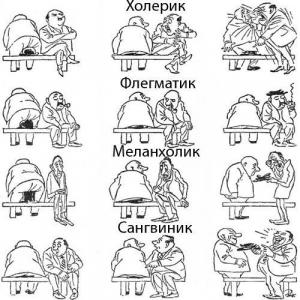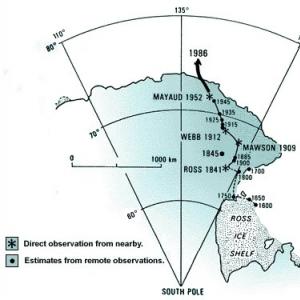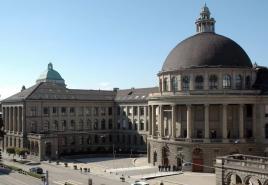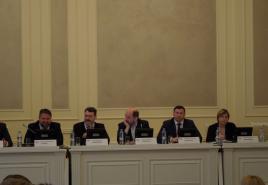Kazan Federal University. From the history of the Faculty of Chemistry of Moscow State University
The department "Chemical technology of oil and gas" trains bachelors in the framework of the direction 18.03.01 "Chemical technology" in the training profiles:
"Chemical technology of natural energy carriers and carbon materials"
"Chemical technology of organic substances"
Graduates of the Chemical Technology direction can work at oil refinery facilities, at all petrochemical production enterprises (pyrolysis, ethyl alcohol, phenol acetone, alkylation, polyethylene, etc. workshops), as well as at all enterprises equipped with auto and air transport.
Database of teaching staff of the department "KhTNG"
Makhmudova Lyubov Shirvanievna
Position: Head of the department "KhTNG", Dean of NTF
Academic degree: Doctor of Technical Sciences
Academic title: department professor
Education: Grozny Oil Institute, chemical engineer - technologist
Training: visiting foreign internships:
Finland-Sweden (2012), Italy (2014)
Total work experience: 26 years
Work experience in the specialty: 26 years.
Subjects taught: Promising Processes for Obtaining
high-quality motor fuels, chemical technology
Fuels and carbon materials. physical and chemical bases
Nanotechnology
Akhmadova Khava Khamidovna
Position: Professor of the Department of Chemical Technology oil and gas"
Academic degree: Doctor of Technical Sciences
Academic title: associate professor at the department, professor of the Russian Academy of Natural Sciences.
Education: Grozny Oil Institute,
Chemical Process Engineer (1974)
Training: doctoral studies at UGNTU
2008-2013
Total work experience: 48 years
Work experience in the specialty: 40 years.
Subjects taught: Chemistry and technology of organic substances, design of industry enterprises, modeling of chemical and technological processes, petrochemical technology
synthesis, basics of production of organic synthesis catalysts
Chemical technology for the production of polyolefins, production
Surfactants production
Macromolecular compounds, monomers and intermediates
organic synthesis.
Abdulmezhidova Zulay Abdulovna
Position: Associate Professor of the Department
Academic degree: candidate of technical sciences
Academic title: Associate Professor at the Department of Chemical Technology of Oil and Gas
Education: Grozny Oil Institute, Chemical Process Engineer,
"Chemical technology of oil and gas"
General work experience: 25 years
22 years old
Teaching disciplines: Petroleum chemistry, fuel and energy complex. theoretical foundations of the chemical technology of fuel and
carbon materials, chemical technology of fuels and carbon materials
Khadisova Zhanati Turpalievna
Position
Academic degree: PhD in Chemistry
Academic title: assistant professor
Education: Grozny Oil Institute: chemical engineer
"Technology of the main organic and
Petrochemical Synthesis"
Advanced training and professional retraining:
2011 Course "Innovative technologies in higher education"
Educational center of information technologies MSTI.
General work experience: 30 years
Work experience in the specialty: 25 years
Subjects taught Keywords: Physical chemistry, colloidal chemistry, theory of chemical processes of organic synthesis, technology of elastomers and HMS, production of surfactants.
Sadulaeva Albika Supyanovna
Position: Associate Professor of the Department "Chemical technology of oil and gas",
Scientific Secretary of the Council of the Faculty of Petroleum Engineering.
Academic degree: candidate of technical sciences;
Education:
Chemical technologist
General work experience: 16 years.
Work experience in the specialty: 16 years.
Subjects taught: Chemical technology of oil production, chemistry of oil and gas. technological processes of automated production. Fundamentals of the oil business, chemical rectors. oil and gas processing technology.
Mutsalova Satsita Shahidovna
Position: Associate Professor of the Department "Chemical technology of oil and gas"
Academic degree: PhD in Chemistry;
Education: Chechen-Ingush State University (Chemistry)
General work experience: 25 years.
Work experience in the specialty: 20 years.
Subjects taught Keywords: organic chemistry, physical chemistry, colloidal chemistry, chemistry in construction
Atayeva Aminat Akhmedovna
Position: Associate Professor of the Department "Chemical technology of oil and gas"
Academic degree: candidate of biological sciences;
Education: Chechen-Ingush State University (Biology)
General work experience: 17 years.
Work experience in the specialty: 14 years.
Subjects taught: Analytical chemistry and FHMA, surface phenomena and disperse systems.
Takaeva Madina Atlaevna
Position: senior lecturer of the department
"Chemical technology of oil and gas".
Academic degree: applicant for the degree of candidate of technical sciences
Education: Grozny Oil Institute (GNI),
Chemical technology natural
Energy carriers and carbon materials,
Chemical Process Engineer (1998)
Training: In 2006 passed FPC in GGNTU,
General work experience: 21 years old
Work experience in the specialty: 15 years
Teaching disciplines: Introduction to the chemical technology of fuels and carbon materials, heterogeneous catalysis and the production of catalysts. surface phenomena in oil dispersed systems,
fundamentals of scientific research and design, student research work, petroleum chemistry. introduction to the profession.
Musaeva Milana Abuevna
Position: senior lecturer of the department
"Chemical technology of oil and gas"
Academic degree: - applicant for the degree of candidate of technical sciences
Academic title: -
Education
Engineer chemical technologist (2001)
Training: In 2006, I passed the FPC at GGNTU,
Direction of training: Fundamentals of Informatics,
Legal support of the activities of the university,
.
General work experience: 20 years
Work experience in the specialty: 11 years.
Subjects taught: General chemical technology. chemistry technology of organic substances. design of industry enterprises, modeling of chemical and technological processes, technology of petrochemical synthesis. production of surfactants, production of macromolecular compounds, student's educational and research work.
Idrisova Eliza Usamovna
Position: assistant of the department "HTNG"
Academic degree: candidate of technical sciences
Academic title: -
Education: Grozny State Oil Institute,
Engineer - chemical technologist.
Advanced training and professional retraining: -
Total work experience: 15 years
Disciplines taught: OHT. basics of catalyst production,
Design of industry enterprises, production of HMS, production of surfactants, modern principles of preparation and methods of analysis of fuels,
theory of CT and POS, technology of oil and gas production, technology of oil and gas processing, UIRS on specialization, chemical technology of production of polyolefins, chemistry of oil and gas, theoretical foundations of chemical technology.
Abubakarova Aset Suleymanovna
Position: Senior Lecturer, Department of Chemical Technology
Oil and Gas»
Education: Grozny State Oil Institute,
Chemical technologist
Advanced training and professional retraining
In 2006 and 2011 passed FPC in GGNTU,
Direction of training: Fundamentals of Informatics,
Legal support of the activities of the university,
Fundamentals of Pedagogy and Psychology.
"Innovative technologies in higher
Vocational Education".
Has a license and certificates.
Since 2010 is an applicant for the Kuban State Agrarian University, the topic of the dissertation is “The influence of the chemical composition of ceresins on their physical and mechanical properties
General work experience: 12 years old
Work experience in the specialty: 12 years old
Subjects taught: Physical chemistry, colloidal chemistry, organic chemistry. methods for testing the quality of petroleum products. UIRS by specialty
Magomadova Madina Khusenovna
Position: assistant of the department "HTNG"
Academic degree: applicant for the degree of candidate of technical sciences
Academic degree: -
Education: Grozny State Oil Institute,
Engineer-chemical technologist.
Advanced training and professional retraining:
In 2007, I passed the FPC at the State State Tax Inspection, certificate No. 2,
Direction of training: Fundamentals of Informatics,
Legal support of the activities of the university,
Fundamentals of Pedagogy and Psychology .
Total work experience: 15 years
Work experience in the specialty: 9 years
Subjects taught: Methods for the separation of petroleum products. Modeling of chemical-technological processes. OKHT Modern principles of preparation and methods of analysis of fuels and products Chemical technology of production of polyolefins. Surfactant production.
Ibragimova Madina Dobievna
Position: assistant of the department "HTNG"
Academic degree:
Academic degree:
Education: Grozny State Oil Institute,
Engineer-chemical technologist.
Advanced training and professional retraining:
FPK NRNU MEPhI, "Development of master's programs"
1-14.10.2012
Total work experience: 9 years
Work experience in the specialty: 9 years
Subjects taught: Methods for testing the quality of petroleum products, advanced processes for obtaining fuels, oil and gas processing technology, fuel and energy complex, UIRS by specialization.
President - Academician Lunin Valery Vasilyevich
Dean - corresponding member Kalmykov Stepan Nikolaevich
Chemistry as a scientific discipline appeared at Moscow University in the first year of its existence. The founder of the university M.V. Lomonosov, a great scientist, poet and artist, was also one of the best chemists of his time. The Department of Chemistry appeared at the Faculty of Medicine shortly after the formation of Moscow University in 1755. Many generations of Russian chemists, who entered the history of world science, studied and taught at the Faculty of Chemistry of Moscow State University.
Today, the faculty includes 17 departments and 1 interdepartmental laboratory, which represent all modern areas of chemical science and relevant specializations, in which highly qualified chemists are trained.
 Departments of the Faculty of Chemistry:
Departments of the Faculty of Chemistry:
- Physical Chemistry (Head of the Department - Academician of the Russian Academy of Sciences V.V. Lunin);
- (head of the department - professor A.V. Shevelkov);
- (acting head of the department - Professor M.A. Proskurnin);
- (Head of the Department - Professor V.G. Nenaidenko);
- Medical Chemistry and Fine Organic Synthesis (Head of the Department - Professor E.R. Milaeva);
- (Head of the Department - Corresponding Member of the Russian Academy of Sciences S.D. Varfolomeev);
- (Head of the Department - Corresponding Member of the Russian Academy of Sciences E.V. Antipov);
- Chemistry of Natural Compounds (Head of the Department - Academician of the Russian Academy of Sciences O.A. Dontsova);
- chemical technology and new materials (head of the department - professor V.V. Avdeev);
- Chemistry of Petroleum and Organic Catalysis (Head of the Department - Professor E.A. Karakhanov);
- chemical kinetics (head of the department - professor M.Ya. Melnikov);
- macromolecular compounds (head of the department - corresponding member of the Russian Academy of Sciences A.A. Yaroslavov);
- (Head of the Department - Corresponding Member of the Russian Academy of Sciences S.N. Kalmykov);
- general chemistry (head of the department - professor S.F. Dunaev);
- laser chemistry (head of the department - professor A.V. Stolyarov);
- colloid chemistry (head of the department - professor V.G. Sergeev);
- Fundamental Foundations of Chemistry (Head of the Department - Academician of the Russian Academy of Sciences M.P. Egorov).
The Interdepartmental Laboratory of Computational Methods in Chemistry is headed by Associate Professor V.S. Lyutsarev.
The faculty has more than 1800 employees, including 9 academicians and 17 corresponding members of the Russian Academy of Sciences, more than three hundred and fifty teachers and about 700 researchers. More than 1200 students and about 300 graduate students study at the faculty.
The faculty trains broad-profile chemists in all areas of modern chemistry, taking into account the latest scientific trends, including those related to the production of new materials and drugs, scientific activities in the field of resource-saving and nanotechnologies. In addition, members of the Faculty of Chemistry teach chemistry at a number of other faculties of the Moscow State University, as well as in the branches of the Moscow State University in Baku (Republic of Azerbaijan), in Dushanbe (Republic of Tajikistan) and the joint University of MSU-FPI in Shenzhen (People's Republic of China). ). The high qualification of graduates of the Faculty of Chemistry is also due to the fact that from the first year each student is involved in scientific work, participates in projects and conferences on relevant topics.
International connections, excellent teaching staff, a unique atmosphere that you feel from the first minutes of being a student, a place where you want to return every day - all this is the Faculty of Chemistry.
 Regardless of the future specialization, all students study general fundamental disciplines during the first 3 years. These are: higher mathematics, physics, a foreign language, humanitarian subjects and, of course, basic chemical disciplines. Up to 40% of the study time is allocated for the study of chemical disciplines in the curriculum, which is divided approximately equally between theoretical classes and laboratory work. Considerable attention is paid to fundamental physical and mathematical training. Up to 20% of the study time is devoted to the study of higher mathematics, applied mathematics, general and theoretical physics, which is almost twice as much as in any other chemical universities in the country.
Regardless of the future specialization, all students study general fundamental disciplines during the first 3 years. These are: higher mathematics, physics, a foreign language, humanitarian subjects and, of course, basic chemical disciplines. Up to 40% of the study time is allocated for the study of chemical disciplines in the curriculum, which is divided approximately equally between theoretical classes and laboratory work. Considerable attention is paid to fundamental physical and mathematical training. Up to 20% of the study time is devoted to the study of higher mathematics, applied mathematics, general and theoretical physics, which is almost twice as much as in any other chemical universities in the country.
Graduates of the faculty, as well as graduates of other universities, can continue their studies in the magistracy of the faculty in several programs, including the recently opened direction "Chemical Technology". The term of study in the master's program is 2 years. Graduates of the faculty who have good and excellent grades for all the years of study and have shown an inclination for research work have the opportunity to continue their studies in the graduate school of the faculty.
We want to see talented young people who are passionate about the ideas of chemistry as our students. To do this, the faculty has created a network of "sponsored" schools, lyceums, gymnasiums, in which classes are conducted according to a special university program.
In order to attract talented young people to MSU, since 1993, the Faculty has been conducting a preliminary selection of the most talented students through Olympiads, not only from Moscow schools, but also from urban and rural schools throughout Russia, and even from the former republics of the Soviet Union.
The faculty is waiting for talented, gifted and daring young people who are eager to benefit the Fatherland and continue the glory of Russian science.
More information about the faculty:
Close cooperation of the Department of Geology of Oil and Gas. A.A. Trofimuk Faculty of Geology, KSU named after. IN AND. Ulyanov-Lenin (now the Institute of Geology and Oil and Gas Technologies KFU) and the Laboratory of Chemistry and Geochemistry of Petroleum (formerly the Laboratory of Petroleum Chemistry) IOPC named after. A.E. Arbuzov - a special structural unit of the FRC (formerly KFAN of the USSR) has a long history. In the late 60s - early 70s of the XX century, the head of the department, Professor Troepolsky V.I. and head of the laboratory Kurbsky G.P. and their employees establish business contacts in order to discuss the relationship between the chemical composition and physico-chemical properties of oil and the geological conditions of the deposits and oil deposits of the Ural-Volga region and nearby regions. In 1982, a special joint expedition was organized to take oil samples in almost all oil and gas production departments of PA Tatneft. The expedition was attended by Professor of the Department of KSU Troepolsky V.I., Head. laboratory of IOPC Romanov G.V. and senior researcher laboratory Semkin V.I. The results of friendly mutually beneficial contacts are reflected in joint publications, reports at various meetings and conferences on oil topics, held, including abroad. To date, a number of monographs have been published:
 |  |  |
Periodically in the Laboratory of Chemistry and Geochemistry of Petroleum IOPC them. A.E. Arbuzov, research was carried out as part of the coursework and theses of students of the university department. Head of the KFU laboratory Sharipova N.S. under the scientific supervision of senior researcher Laboratory of Chemistry and Geochemistry of Petroleum Institute of Chemical Physics, Doctor of Science Kayukova G.P. Ph.D. thesis was defended on the topic “Selection of conditions for chromatographic methods for identifying genotypes of organic matter in oil field rocks” (2008).
As a result of such a creative collaboration between the teams of KFU and IOPC, in 2013 there was an Agreement on cooperation between KFU and IOPC, and then the Agreement on the establishment of a joint base department of Chemistry of Petroleum No. KFU and IOPC them. A.E. Arbuzov KazSc RAS. The employees of the base department at that time were the leading scientists of the Institute of Chemical Physics, employees of the Laboratory of Chemistry and Geochemistry of Petroleum, Doctor of Chemical Sciences, Professor, Corresponding Member. Academy of Sciences of the Republic of Tatarstan Romanov G.V., Doctor of Chemical Sciences, prof. Yusupova T.N., Doctor of Chemical Sciences Kayukova G.P., Doctor of Chemical Sciences Ganeeva Yu.M.

Employees of IOPC them. A.E. Arbuzov and the Department of Geology of Oil and Gas. A.A. Trofimuk: Doctor of Chemistry Kayukova G.P., Candidate of Geology and Mathematics, Assoc. Smelkov V.M., Doctor of Chemical Sciences, prof. Yusupova T.N., assistant Nosova F.F., Doctor of Chemistry, corresponding member. AS RT, prof. Romanov G.V.
In 2017, FASO and the Ministry of Education and Science of the Russian Federation approved the Regulations on the establishment of a basic department, and since the 2017/2018 academic year, the basic department began to fully carry out its scientific and pedagogical activities. According to the Regulations, “... the basic Department of Petroleum Chemistry implements the educational process on the basis of strengthening the ties between KFU and the Institute of Chemistry. A. E. Arbuzov KazSC RAS by providing practical training for students of KFU on the basis of IOPC named after. A. E. Arbuzov KazSC RAS in accordance with the directions determined by their Charters.
Head of Department: Professor
The department conducts teaching activities within the framework of special courses for undergraduate and graduate students assigned to the department.
The main scientific directions of the department:
- Development of promising catalytic processes for petrochemical and organic synthesis, advanced oil refining processes.
- heterogeneous catalysis. homogeneous catalysis. Molecular design of macrocomplex catalysts. supramolecular catalysis. nanostructured catalysts.
- Chemistry of grafted surface compounds.
- Hydrogen-free desulfurization processes. Chemistry of organic compounds of sulfur and nitrogen of petroleum origin.
- Alicyclic and framework compounds. Macrocycles.
From the history of the department
At the beginning of the 20th century, professor N.D. Zelinsky began research on the catalytic transformations of hydrocarbons. Later, on the initiative of Nikolai Dmitrievich, who had already become an academician, two laboratories were created at the Department of Organic Chemistry, which he headed: the Laboratory of Petroleum Chemistry (1929) and the Laboratory of Organic Catalysis (1930). Then these laboratories were transformed into the Department of Petroleum Chemistry (1938) and the Department of Organic Catalysis (1940), respectively. The Department of Petroleum Chemistry was headed by Academician N.D. Zelinsky (1938 - 1953), Academician B.A. Kazansky (1953 - 1960) and Professor A.F. Plate (1960 - 1968), and the Department of Organic Catalysis - Academician A.A. Balandin (1940 - 1967). The Department of Organic Catalysis included two laboratories: the Laboratory of Organic Catalysis (Head of the Laboratory, Academician A.A. Balandin); laboratory of catalytic synthesis (head of the laboratory, Prof. M.B. Turova-Polyak). At the department in 1953-1968. there were two specializations for the training of young specialists: organic catalysis, catalytic synthesis. The Department of Petroleum Chemistry included three laboratories: the Laboratory of Petroleum Chemistry (headed by Academician B.A. Kazansky, Prof. A.F. Plate); Laboratory of Chemistry of Artificial Liquid and Gaseous Fuels (Head of the Laboratory, Corresponding Member N.I. Shuikin); Laboratory of Chemistry of Hydrocarbons and Lubricating Oils (Head of the Laboratory Prof. P.P. Borisov). In the period from 1953 to 1968, the department had three specializations in which students were trained: oil chemistry, chemistry of artificial liquid and gaseous fuels, chemistry of hydrocarbons and lubricating oils. After the death of A.A. Balandin (1967), on the basis of these two departments, in 1968, a joint department of petroleum chemistry and organic catalysis was created, which was first headed by Professor A.F. Plate, and from 1983 to the present - Professor E.A. Karakhanov. Three laboratories were organized in the structure of the department. Since 1968, the number of laboratories has not changed, although their names and staffing have undergone some changes. Many talented chemists worked in the listed laboratories and departments. These are Academicians N.D. Zelinsky, B.A. Kazansky, A.A. Balandin, corresponding member Academy of Sciences of the USSR N.I. Shuikin, corresponding member RAS V.V. Lunin; Professor M.B. Turova-Polyak, A.F. Plate, P.P. Borisov, S.I. Khromov, A.A. Tolstopyatov; associate professors - I.N. Tits-Skvortsova, M.S. Eventova, E.M. Tarasova, A.E. Agronomists. Scientific topics are developing in the traditional directions laid down by N. D. Zelinsky, B.A. Kazansky, A.A. Balandin. The main thing is the development of fundamental questions concerning the nature of catalysis. The main scientific directions of the department: development of promising processes for oil refining; metal complex supramolecular catalysis; creation of macrocomplex catalysts with the function of molecular recognition; chemistry of grafted surface compounds; chemistry of polycarbon substances; evolutionary catalysis; chemistry of alicyclic and framework compounds; chemistry of organic sulfur compounds.







